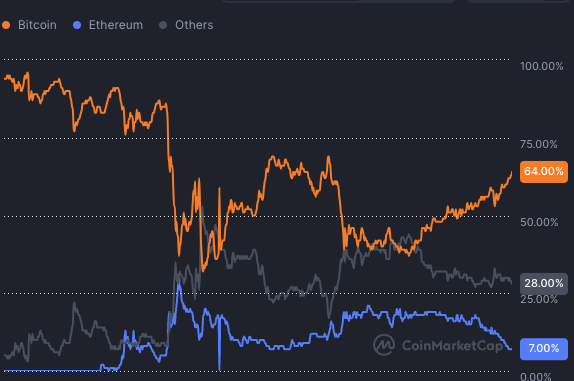Bitcoin payments nosedive while Ethereum rises, Bitrefill study shows 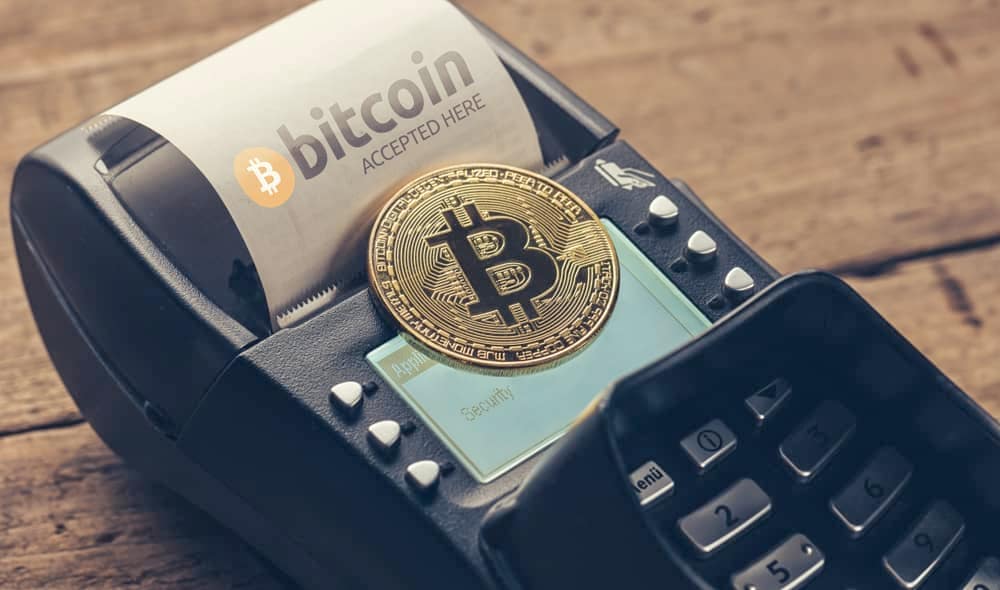
![]() Cryptocurrency Aug 28, 2024 Share
Cryptocurrency Aug 28, 2024 Share
The cryptocurrency market has experienced a short-term crash, but analysts remain bullish for the long-term, foreseeing an upcoming altseason. In this scenario, Bitcoin, Ethereum, and other digital assets compete for market share in crypto payments.
A recent study by Bitrefill, one of the largest crypto-commerce platforms, has revealed a significant shift in users’ payment preferences, giving insights into the demand for these cryptocurrencies.
According to the research conducted by Matt Ahlborg and posted on August 27, Bitcoin’s (BTC) dominance in payments on the platform has plummeted by a staggering 55% in relative terms compared to the previous quarter. On that note, data from March shows BTC with a 33.8% dominance, against the 15% current market share.
Picks for you
‘Rich Dad’ Robert Kiyosaki portfolio: Millionaire’s top 5 assets 10 hours ago Cardano founder fears ‘death of U.S. crypto industry’ if Kamala Harris is elected 10 hours ago Analyst explains why XRP could drop to $0.30 10 hours ago Kamala Harris proposes highest Capital Gains Tax in over 100 years for stocks and crypto 11 hours ago
This significant decline highlights a changing landscape in the crypto payment ecosystem, with alternative cryptocurrencies and stablecoins gaining traction.
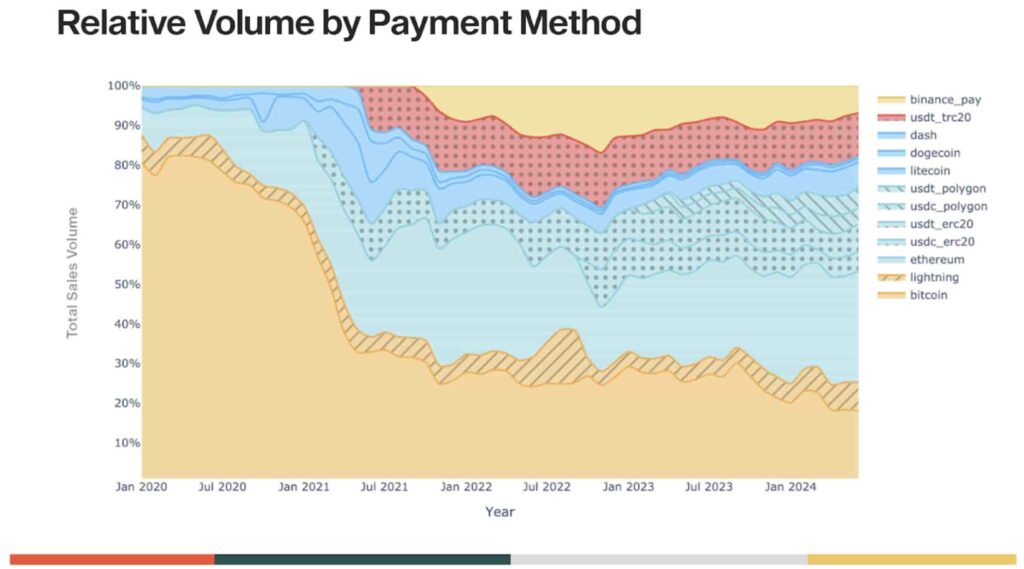 Relative Volume by Payment Method. Source: Bitrefill / Matt Ahlborg
Relative Volume by Payment Method. Source: Bitrefill / Matt Ahlborg
Crypto payments: Ethereum ecosystem rises as Bitcoin falters
While Bitcoin’s share of payments has decreased, the Ethereum (ETH) ecosystem has seen substantial growth. Ethereum-based users now account for 28% of total users on Bitrefill, boasting the highest average purchase value among customers.
Matt Ahlborg attributes this surge in Ethereum’s popularity to the increasing value returned to the base token from various DeFi projects, ICOs, and NFT ventures.
Interestingly, stablecoins on Ethereum’s layer two solutions, particularly Polygon (MATIC), have outpaced their mainchain counterparts. This shift underscores the growing importance of scalability and lower transaction costs in the crypto payment space.
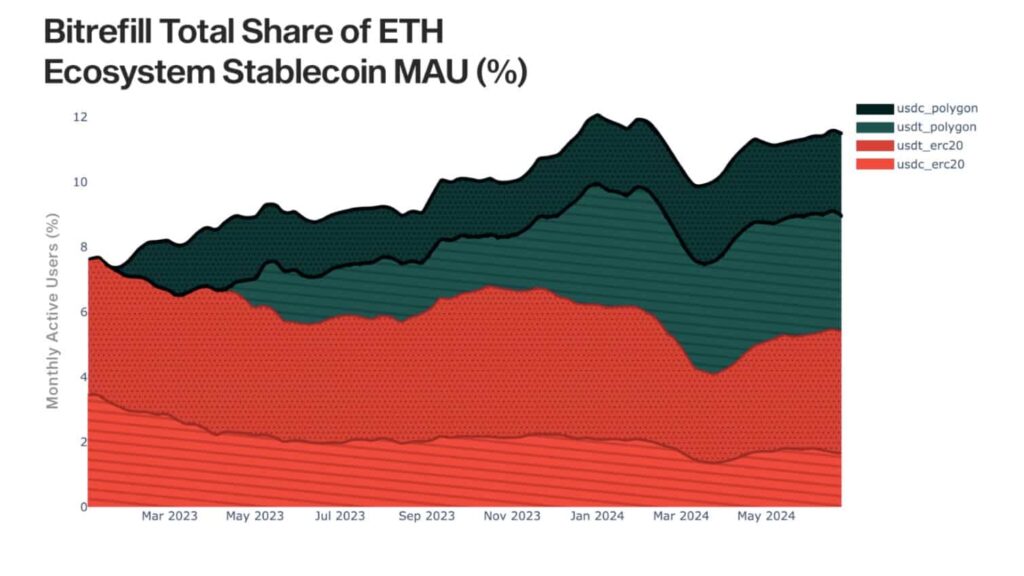 Bitrefill total share of ETH ecosystem stablecoin MAU (%). Source: Bitrefill / Matt Ahlborg
Bitrefill total share of ETH ecosystem stablecoin MAU (%). Source: Bitrefill / Matt Ahlborg
Litecoin, Dogecoin, and Dash payments
The study also points to “Legacy coins” such as Litecoin (LTC), Dogecoin (DOGE), and Dash (DASH) maintaining their popularity. In particular, Litecoin is experiencing a steady uptrend on Bitrefill. According to Ahlborg, these coins have benefited from their widespread availability on exchanges and wallets, serving as effective mediums of exchange.
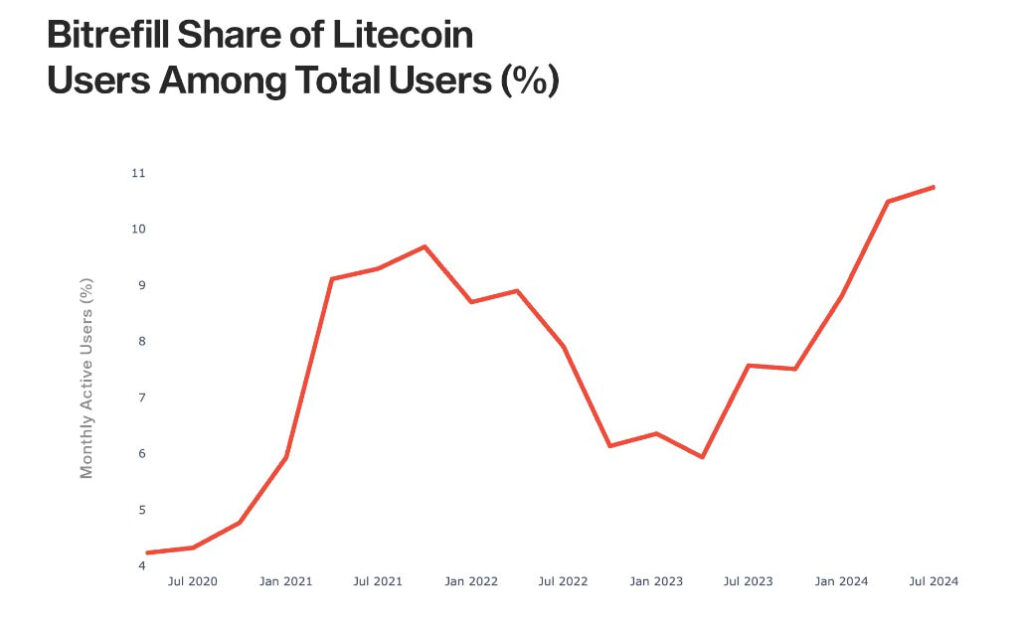 Bitrefill share of Litecoin Users Among Total Users (%). Source: Bitrefill / Matt Ahlborg
Bitrefill share of Litecoin Users Among Total Users (%). Source: Bitrefill / Matt Ahlborg
Moreover, USDT on the TRON network (TRX) has emerged as a major player in the crypto payment landscape. Despite a 350% increase in network fees since early 2023, USDT_TRC20 remains the world’s most preferred crypto payment rail, surpassing both Bitcoin and Ethereum.
However, the fee hike has caused a slight decline in its payment share on Bitrefill, particularly for transactions under $10.
Lightning Network as a BTC alternative
As transaction costs for major cryptocurrencies like Bitcoin, Ethereum, and USDT on TRON consistently exceed $1, users increasingly turn to alternative chains and protocols – some of which are not yet directly supported by the platform.
Therefore, Matt concludes his study by warning of the growing importance of compatibility and interoperability between chains and protocols.
…become consistently expensive and have caused a fragmentation of crypto activity onto many chains and protocols. Compatibility and interoperability between chains/protocols is now critical to the underlying value of each base asset.
— Matt Ahlborg (@MattAhlborg) August 27, 2024
The study also reveals that the Lightning Network has seen an increase in market share as a direct alternative to Bitcoin’s blockchain. Nevertheless, Ahlborg points out that most of these payments are from custodial wallets and usually have remarkably low values.
In conclusion, while Bitcoin’s payment dominance has significantly decreased, the overall crypto payment landscape is becoming more diverse and competitive. As the industry matures, platforms and users will need to adapt to these changing preferences and technological advancements.
